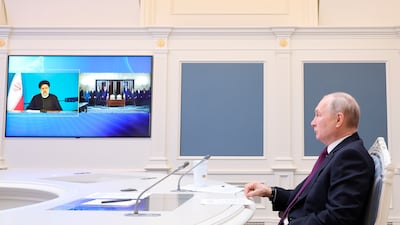Russian President Vladimir Putin and Iranian leader Ebrahim Raisi on Wednesday witnessed the signing of a deal to finance and build an Iranian railway line as part of the North–South Transport Corridor that involves more than a dozen countries.
The Rasht-Astara railway is seen as an important link in the corridor, intended to connect India, Iran, Russia, Azerbaijan and other countries by rail and sea. Russia said the project can rival the Suez Canal as a trade route.
“The unique North-South transport artery, of which the Rasht-Astara railway will become a part, will help to significantly diversify global traffic flows,” Mr Putin said, who watched the signing ceremony by video.
He also said the 162km railway along the Caspian Sea coast would help to connect Russian ports on the Baltic Sea with Iranian ports in the Indian Ocean and the Arabian Gulf.
“Without a doubt, this agreement is an important and strategic step in the direction of co-operation between Tehran and Moscow,” Mr Raisi said.

Russia and Iran have been pushed to strengthen their political and economic ties by western economic sanctions on each, which both say are unjustified.
Since the 1979 revolution that swept US-backed Shah Mohammad Reza Pahlavi from power, Iran has been ostracised by the West and its economy attacked with a myriad sanctions. It holds around a quarter of the Middle East's oil reserves.
The West also imposed restrictions on Iran's nuclear programme, while Russia was sanctioned following its military operations in Ukraine.

